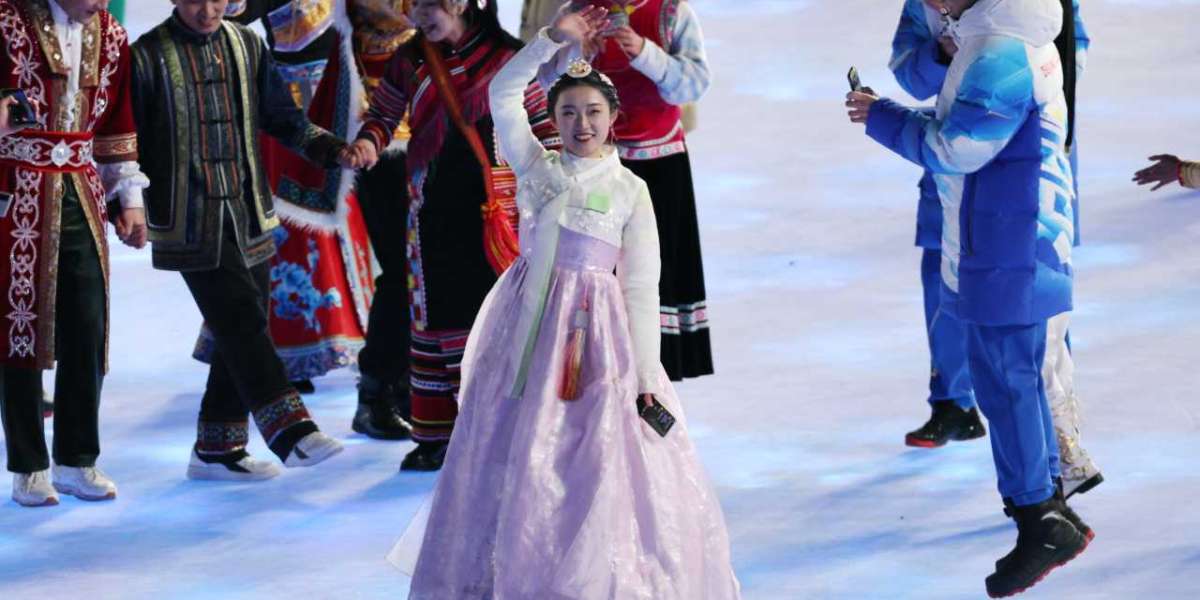China and Korea have been at odds for decades over a variety of features of Korean culture that China claims as its own. The hanbok has become the newest flashpoint in this long-running dispute.
A new issue developed Friday night when a performer dressed in hanbok, or traditional Korean dress, was spotted taking part in the opening ceremony of the Beijing Winter Olympics.
During Friday's event, a woman dressed in a white and pastel pink hanbok marched among other performers as participants representing 56 ethnic groups in China carried the Chinese national flag into Beijing's National Stadium.
Several Koreans expressed outrage at the appearance of a hanbok-clad performer as a member of an ethnic minority. Many accused the Chinese government of attempting to "steal" Korean culture and accusing it of cultural appropriation, while others expressed support for the performance.
In response to the uproar surrounding the hanbok worn during the opening ceremony, National Assembly Speaker Park Byeong-seug, who was in China for the event, had an online discussion with Korean journalists in Beijing on Sunday.
In response to the debate and worries in Korea (connected to the hanbok), Park stated, "I aired my viewpoint on the issue." In the evening of Saturday, Park met with Li Zhanshu, chairman of the Standing Committee of the National People's Congress (NPC) of China, and had a meal with him.
Korea's concerns were taken into consideration by the chairman, who stated that he would communicate (Korea's viewpoint) to the appropriate authorities. There is no one who does not believe that the hanbok is the most emblematic of Korean culture. It is important for us to be proud of our culture," the speaker continued.
South Korea's leading presidential hopefuls were quick to accuse China of attempting to grab Korean culture for itself.
"Do not be envious of the culture" (of others). "We must oppose cultural appropriation," Lee Jae-myung, the candidate for the ruling Democratic Party of Korea, posted on his Facebook page only hours after the event took place.
Hanbok was among the costumes of China's ethnic minorities during the Olympics, according to Park Chan-dae, a politician and spokeswoman for Lee's campaign team. Park Chan-dae expressed his great remorse over the appearance of hanbok on such a worldwide platform. In a statement released on Saturday, he stated that China's persistent claims to Korean culture had evolved into a "very grave issue."
In an interview with reporters on Saturday, main opposition People Power Party presidential candidate Yoon Suk-yeol said the kingdoms of Goguryeo and Balhae were "our proud and magnificent past." Yoon Suk-yeol was on his way to Jeju Island to campaign for the presidency. Meanwhile, his campaign spokeswoman Lee Yang-soo said that the opening ceremony of the Beijing Winter Olympics had been "tarnished."
A Facebook post by Ahn Cheol-soo, a presidential candidate for the tiny opposition People's Party of Korea, stated that "hanbok represents Korean culture.... "I'm informing the Chinese authorities that the outfit was hanbok, not hanfu," says the author.
Hwang Hee, South Korea's Minister of Culture, Sports, and Tourism, sits in the stadium stands on Friday during the opening ceremony of the 2022 Beijing Winter Olympics, which took place at the National Stadium in Beijing. (Yonhap)
meantime, a campaign representative for Yoon slammed the government's team in Beijing, led by Culture, Sports, and Tourism Minister Hwang Hee, for purportedly refusing to officially lodge an objection with the organizers over the hanbok-clad lady in question.
Hwang made his appearance during the opening ceremony in a hanbok.
In a message to Korean media, Hwang expressed concern that the opening ceremony would cause "misunderstanding" in bilateral ties, but said he had no intentions to protest the event. The Korean government has not released an official remark on the matter.
Unofficially, however, a spokesperson for the South Korean Ministry of Foreign Affairs stated on Sunday that the hanbok unquestionably reflects Korean culture, and that the government would keep communicating its view to China that cultural customs must be honored.
In the words of the official, who asked to remain unnamed, "hanbok is unquestionably one of the most representative features of our culture that has been acknowledged by the entire globe." According to the official, he would continue positive dialogue with China and will vigorously promote traditional Korean apparel around the world.
hanbok, according to Seo Kyoung-duk, a professor at Sungshin Women's University and an activist for the promotion of South Korean culture. China has already claimed a disproportionate number of hanboks, she adds. A second recommendation was made by the expert, who encouraged South Korea to do a better job of raising awareness of hanboks as traditional Korean costumes around the world.
There have also been several statements of indignation on online groups and social media platforms in response to the portrayal of hanbok as part of Chinese culture.
Messages such as "Hanbok is traditional Korean attire" and "Don't take our tradition" were frequently seen on the social media platform.


